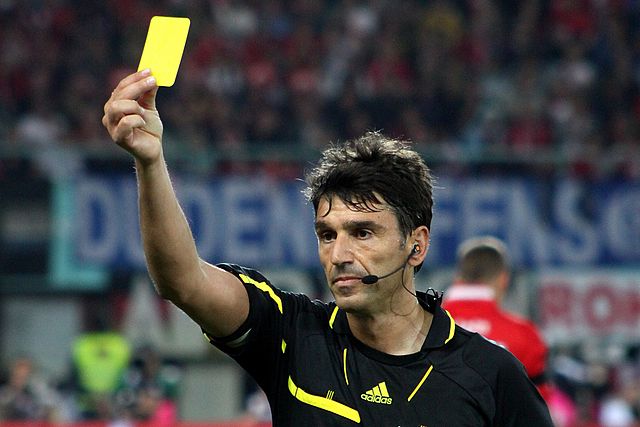Are the World Cup’s added time guidelines a model for the future?
Before the World Cup in Qatar, FIFA’s Chairman of the Referees’ Committee, Pierluigi Collina, announced the tournament would prevent time-wasting in matches. In Qatar, matches often continued beyond the 100-minute mark, with the opening four matches featuring an average of 16 additional minutes.
Collina made a point of noting that “if you have three goals in a half, you’ll probably lose four or five minutes in total to celebrations and the restart”. The officials at the World Cup stuck rigidly to these guidelines throughout the tournament. But did the new guidelines work in clamping down on time wasted during matches and could this be implemented in domestic football?
After the tournament, Opta released statistics on average match time, across the top European leagues, compared to games at the World Cup. On average, the ball is in play for 54 minutes and 49 seconds — 54.9% of the time — during English Premier League matches. At the World Cup, the ball was in play for 58 minutes and four seconds: 2.9% more than the Premier League average. However, in order to achieve this meagre in-play percentage increase, matches lasted over 100 minutes at the World Cup.
After Wales’ 1-1 draw against the USA in the group stage, Wales captain Gareth Bale conceded that the added time put pressure on the players’ fitness. “I felt a little bit tired towards the end,” Bale said. “I can’t believe there were nine minutes added on.” Player fitness was put under considerable strain during the World Cup, with teams expected to play well over the regulation 90 minutes, due to the excessive added time at the tournament.
For just a 24-second increase in the length of time the ball was in play, when compared to 2022-23 matches in the Eredivisie, the additional 12 minutes per match in each World Cup game took their toll on numerous players. The ball is in play on average 1.8% more in the Dutch league than it was at the World Cup, so perhaps it is not the guidelines that need to change, but the overall attitudes to gamesmanship across international football. We must also remember that time-wasting is, of course, more prominent in knock-out football, in which seeing a game out can be significantly more important.
Some might argue that our beautiful game is undergoing constant changes and its very soul and authenticity are wearing thin
Former Arsenal Vice-Chairman David Dein was the latest in a growing line of football professionals, past and present, to suggest football matches should be reduced from 90 to 60 minutes. Dein advocates for the use of a stop-clock to prevent time being lost during VAR checks, goal celebrations and general time-wasting. At present, referees estimate the time to be added on, but this does not necessarily come with precision. Additional time is, therefore, subjective and is not at all standardised. How many times have we been surprised by the number on the board?
Mark Clattenburg, the former Premier League referee, proposed the same idea last April. In Clattenburg’s suggestion, the stop-clock would go one step further and would pause the 60 minutes at every stoppage: “When the ball goes out of play, for example, or there’s an injury causing a delay, or a referee is issuing a yellow card and dishing out a talking-to.” Given the sub-60-minute in-play averages across Europe’s leagues, the introduction of 60-minute matches may mean we actually watch longer games of football on the pitch than ever before.
With the introduction of drastic regulations to the game, some might argue that our beautiful game is undergoing constant changes and its very soul and authenticity are wearing thin. Others might suggest football needs to be revolutionised to complement the introduction of goal-line technology and VAR in the modern game.
Overall, it is clear that the guidelines at the World Cup did help in increasing the number of minutes for which the ball was in play, but the overall percentage of time in play was not significantly higher. Thus, said increase was caused simply by longer matches and not by warding off time-wasting itself. Going forward, if this system finds its way into domestic football, it could certainly be dangerous for players who would be forced to play hundreds of extra minutes every season and could make for less competitive games.
Whatever FIFA decides, hopefully we, as fans, might feel a bit more reassured in the future when the referee gestures to their watch in front of time-wasting players.

Comments